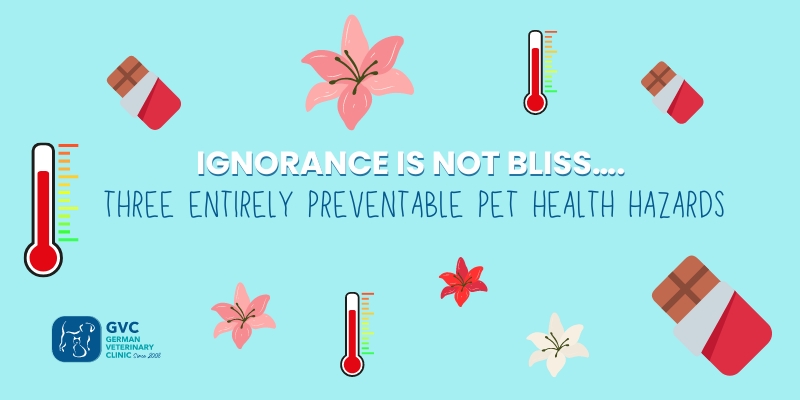Opening Hours: Mon-Fri: 8AM-8PM. Sat-Sun: 9AM-5PM. Public Holidays: 9AM-5PM.
info@germanvet.ae | 025562024

1. Lilies are Lethal!
But they are such pretty flowers and waft out wonderful aromas… Yes, and they are also exceptionally toxic to cats and can be harmful to dogs. A cat that ingests any part from one of several common lily varieties is likely to suffer from serious kidney issues within hours and, without timely veterinary intervention, will likely have a very poor prognosis (including death). For dogs, the toxicity may not be as serious but can still lead to stomach problems, vomiting and potentially serious allergic reactions.
So please, please please… If you are a pet parent, enforce a strict NO lily allowed rule on your property (and let any potential “gifters” know in advance).
2. Chocolate is Poison (to pets)!
Yes, that is correct. Chocolate, that source of human happiness (eating chocolate increases the release of endorphins in our brains) is poison to our pets.
The fact is that a cat or dog that eats chocolate is consuming a poison, to what degree depends on the amount and type of chocolate consumed but all chocolates are toxic to pets. Importantly, the darker the chocolate the higher the level of toxicity due to the presence of theobromine, which, although present in all forms of chocolate, is contained at a much higher volume in dark and cooking chocolates. Theobromine is a natural substance found in the cacao bean and is registered on the National Hazardous Substances Database (USA). If consumed in a large enough dose, it will cause humans to experience some nasty effects. In animals, especially cats and dogs, those doses are much, much smaller, and even a little can have serious and potentially fatal results. So, please do not feed chocolate to your pet, do not leave chocolate lying around and, if feasible, try to keep children eating chocolate away from your pet. Holidays and celebrations can increase risk for pets and chocolate! Fortunately, cats as a rule are unlikely to eat sweet foods, however, we all know of dogs that will happily munch anything and, if this is chocolate, then a very swift trip to the vet is needed!
3. Heat Kills
This is really important because every year pets, especially dogs, will die because they have been over exposed to the sun, heat, or have been over-exerted to the point that their body temperatures increase to levels that are dangerous and can lead to irreversible damage.
“Dogs Die in Cars” is the bleak but true message that the RSPCA promotes each summer. In the UK, a climate that is somewhat different to the UAE’s, the ambient temperature even in summer is often not enough alone to cause serious issues, however, the exceptions are when a pet is left trapped in a car, a conservatory or in another confined space that will intensify the heat and quickly raise the temperature. A car experiencing an outside temperature of 30°C can have an internal temperature in excess of 50°C, after all, cars are metal boxes with lots of heat magnifying glass. So, a parked car in the sun is absolutely not the place to leave a dog and even under cloud cover, those summer temperatures will quickly become a problem. The advice therefore is to leave your pooch pals at home and avoid car rides during summer.
Here in the UAE, with summertime peaks nudging 50°C, just being outside in the summer can quickly cause our pets physical distress and heat issues. However, add into the mix any exertion and those heat issues can escalate rapidly and with dire consequences. So please avoid any exercise with your pet during the hottest hours of the day (e.g. between 8:00 – 17:00 but always check temperatures) and, even in the morning and evenings, please check the ambient temperature, check the surface temperature (tarmac and road surfaces get very hot, too hot for sensitive paws) and keep a very close eye on your dog when you head out for (short) walkies. Any signs of distress should be treated with urgency to allow your dog to cool down (think damp towels, nice cold a/c and plenty of water to beat the thirst).
The fact is that dogs can heat up very quickly and once their body temperature rises above 40°C they are entering in to a potentially very dangerous situation so the advice is clear:
Please protect your dog from the heat!
If you have any questions or concerns relating to any of the above or have any reason to suspect your pet has been exposed to a toxic substance, heat exertion or heat stroke, please get to the vet as soon as possible. Minutes can matter and no Vet will ever be anything but very appreciative of fast-thinking pet parents. Stay safe and stay cool!
GVC was established by Dr Katrin in 2008 and was the very first veterinary clinic in Khalifa City A. We have known many of our clients and patients for close to 10 years and have always held the reputation of being a top quality, dependable and caring service provider.
LINKS

© 2024 German Veterinary Clinic. All rights reserved.
Message Us